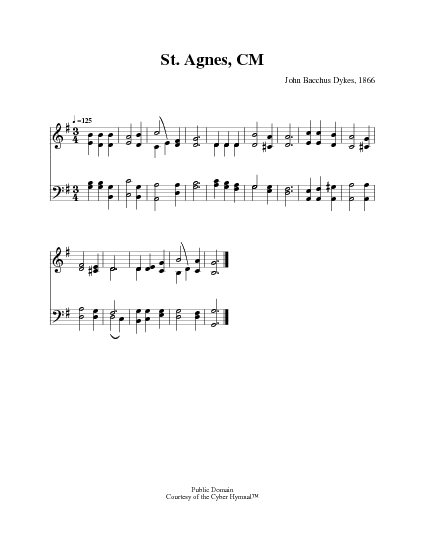- |
User Links
Lord, Thou in all things like wast made

Lord, Thou in all things like wast made
Author: Joseph Anstice (1836)Tune: SILOAM (Woodbury)
Published in 10 hymnals
Printable scores: PDF, MusicXMLAudio files: MIDI
Representative Text
1 Lord, Thou in all things like wast made
To us, yet free from sin,
Then how unlike to us, O Lord,
Replies the voice within.
2 Our faith is weak; O Light of Light,
Clear Thou our clouded view;
That Son of Man, and Son of God,
We give Thee honor due.
3 O Son of Man, Thyself hast proved
Our trials and our tears;
Life's thankless toil and scant repose,
Death's agonies and fears.
4 O Son of God, in glory raised,
Thou sittest on Thy throne:
Thence, by Thy pleadings and Thy grace,
Still succoring Thine own.
5 Brother and Saviour, Friend and Judge!
To Thee, O Christ, be given
To bind upon Thy crown the names
Most blest in earth and heaven.
Amen.
Source: The Hymnal: published by the Authority of the General Assembly of the Presbyterian Church in the U.S.A. #203
Author: Joseph Anstice
Anstice, Joseph , M.A., son of William Anstice of Madeley, Shropshire, born 1808, and educated at Enmore, near Bridgwater, Westminster, and Ch. Church, Oxford, where he gained two English prizes and graduated as a double-first. Subsequently, at the ago of 22, he became Professor of Classical Literature at King's College, London; died at Torquay, Feb. 29, 1836, aged 28. His works include Richard Coeur de Lion, a prize poem, 1828; The Influence of the Roman Conquest upon Literature and the Arts in Rome (Oxford prize Essay); Selections from the Choice Poetry of the Greek Dramatic Writers, translated into English Verse, 1832, &c. His hymns were printed a few months after his death, as:— Hymns by the late Joseph Anstice, M.A., formerly Student… Go to person page >Text Information
| First Line: | Lord, Thou in all things like wast made |
| Author: | Joseph Anstice (1836) |
| Meter: | 8.6.8.6 |
| Language: | English |
| Copyright: | Public Domain |
Lord, Thou in all things like wert [wast] made. J. Anstice. [Passiontide.] First published in his (posthumous) Hymns, 1836, No. 21, in 6 stanzas of 4 lines, and again in the Child's Christian Year, 1841. From the Child's Christian Year it passed as, "In all things like Thy brethren, Thou," into the Leeds Hymn Book, 1853, No. 295. This form of the hymn has become popular, and especially with the Nonconformists. It is sometimes attributed to J. Keble.
--John Julian, Dictionary of Hymnology (1907)
Notes
Lord, Thou in all things like wert [wast] made. J. Anstice. [Passiontide.] First published in his (posthumous) Hymns, 1836, No. 21, in 6 stanzas of 4 lines, and again in the Child's Christian Year, 1841. From the Child's Christian Year it passed as, "In all things like Thy brethren, Thou," into the Leeds Hymn Book, 1853, No. 295. This form of the hymn has become popular, and especially with the Nonconformists. It is sometimes attributed to J. Keble.
--John Julian, Dictionary of Hymnology (1907)
Tune
SILOAM (Woodbury)ST. AGNES (Dykes)
John B. Dykes (PHH 147) composed ST. AGNES for [Jesus the Very Thought of Thee]. Dykes named the tune after a young Roman Christian woman who was martyred in A.D. 304 during the reign of Diocletian. St. Agnes was sentenced to death for refusing to marry a nobleman to whom she said, "I am already eng…


 My Starred Hymns
My Starred Hymns


